Leadership, Power, and Organizational Dynamics: A Comprehensive Report
VerifiedAdded on 2023/06/17
|8
|2507
|123
Report
AI Summary
This report delves into the multifaceted aspects of leadership, focusing on the significance of power, organizational politics, and conflict resolution within modern business environments. It examines various forms of power as defined by French and Raven's theory, including coercive, reward, legitimate, expert, and referent power, illustrating their impact with real-world examples like Mark and Spencer's reward leadership approach. The report also explores organizational politics, categorizing them into 'The Weed,' 'The Rock,' 'The High Ground,' and 'The Wood,' highlighting how these political dynamics influence organizational behavior. Furthermore, it discusses the nature and causes of organizational conflicts, such as differing goals, interdependence, and conflicting values, and analyzes their potential impacts, including decreased productivity and employee turnover. The report concludes by emphasizing the importance of effective leadership in guiding employees towards common goals and resolving conflicts to ensure organizational success. A self-reflective statement underscores the author's enhanced understanding of leadership traits, conflict resolution, and the development of analytical and negotiation skills, highlighting the study's impact on personal and professional growth.
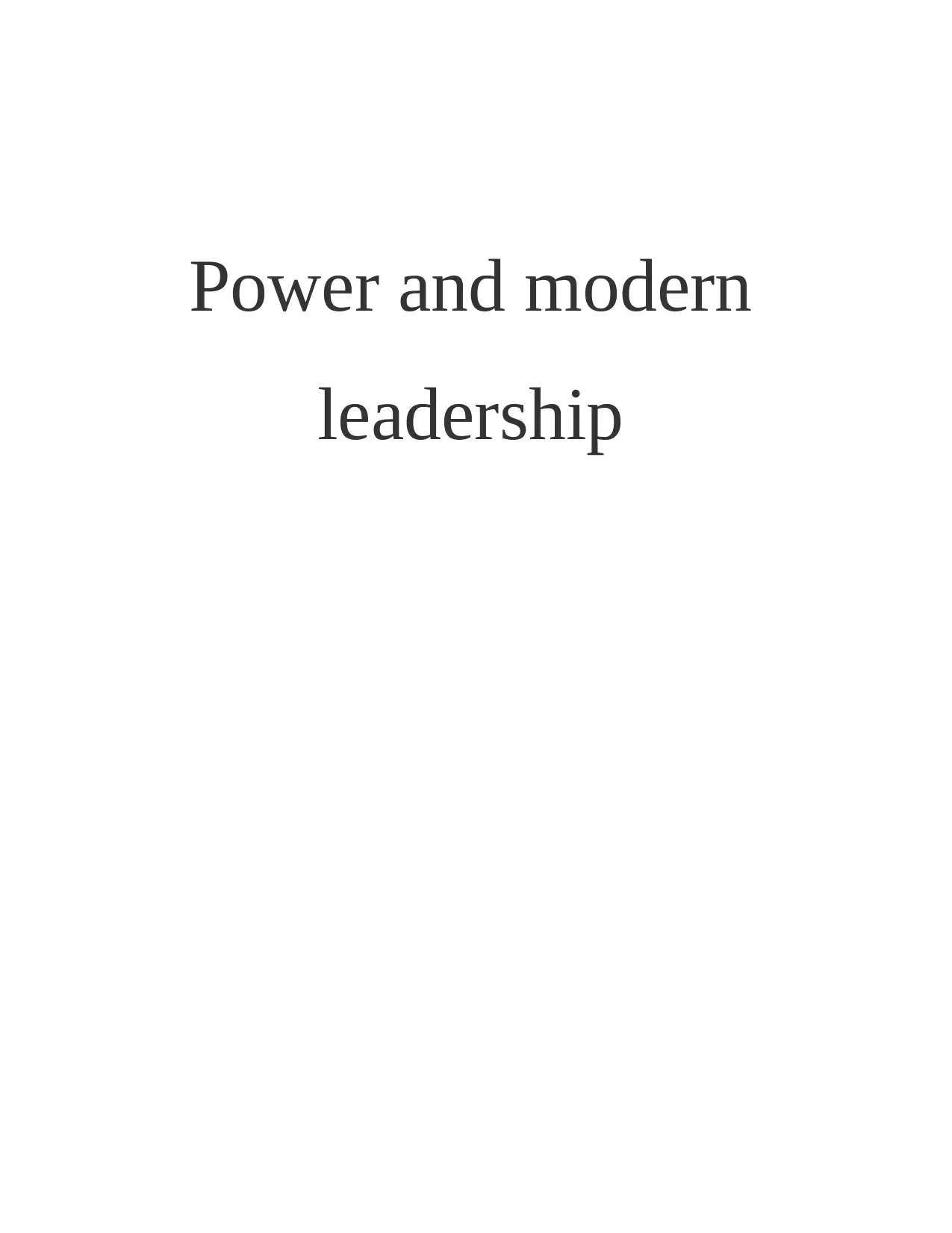
Power and modern
leadership
leadership
Paraphrase This Document
Need a fresh take? Get an instant paraphrase of this document with our AI Paraphraser
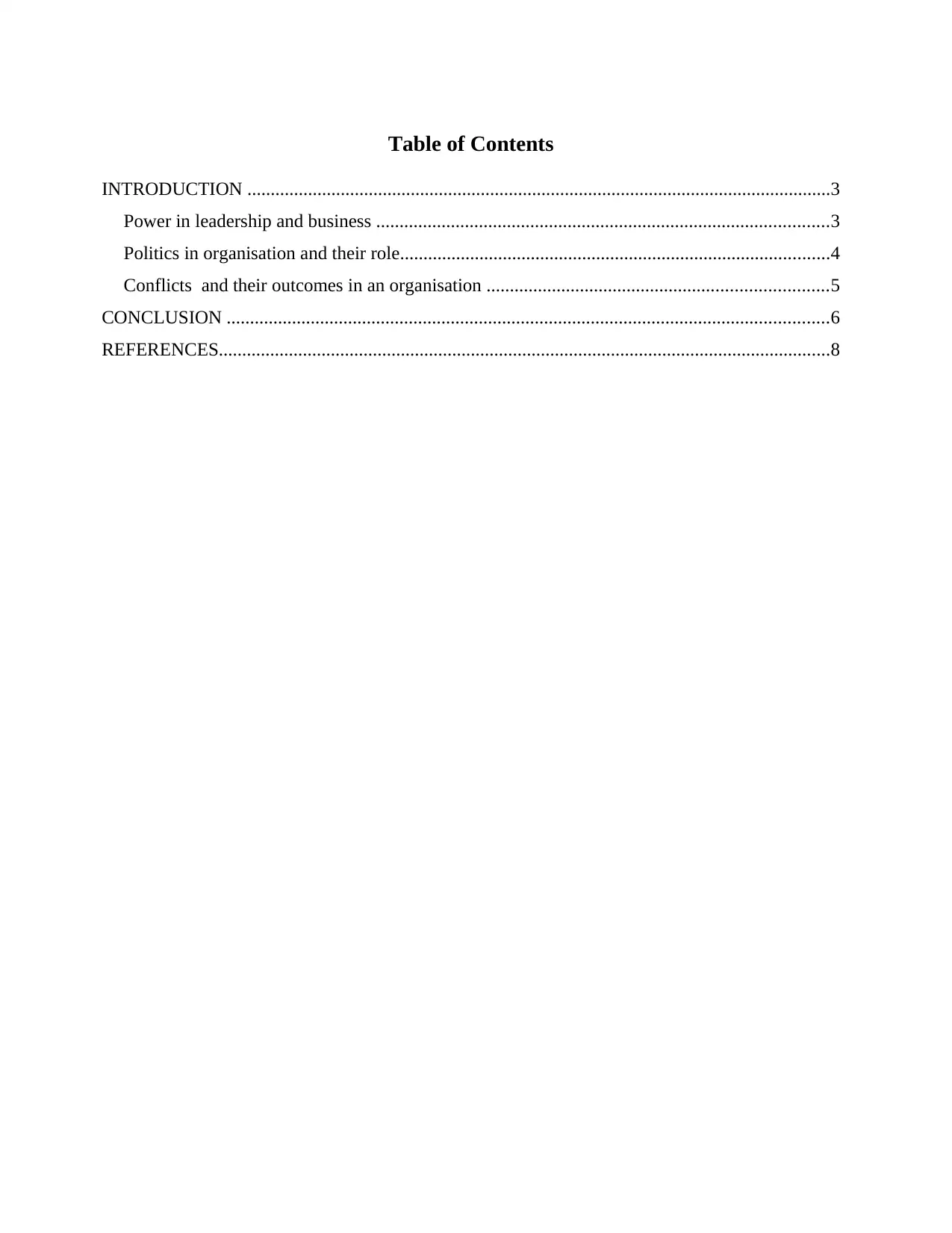
Table of Contents
INTRODUCTION .............................................................................................................................3
Power in leadership and business .................................................................................................3
Politics in organisation and their role............................................................................................4
Conflicts and their outcomes in an organisation .........................................................................5
CONCLUSION .................................................................................................................................6
REFERENCES...................................................................................................................................8
INTRODUCTION .............................................................................................................................3
Power in leadership and business .................................................................................................3
Politics in organisation and their role............................................................................................4
Conflicts and their outcomes in an organisation .........................................................................5
CONCLUSION .................................................................................................................................6
REFERENCES...................................................................................................................................8
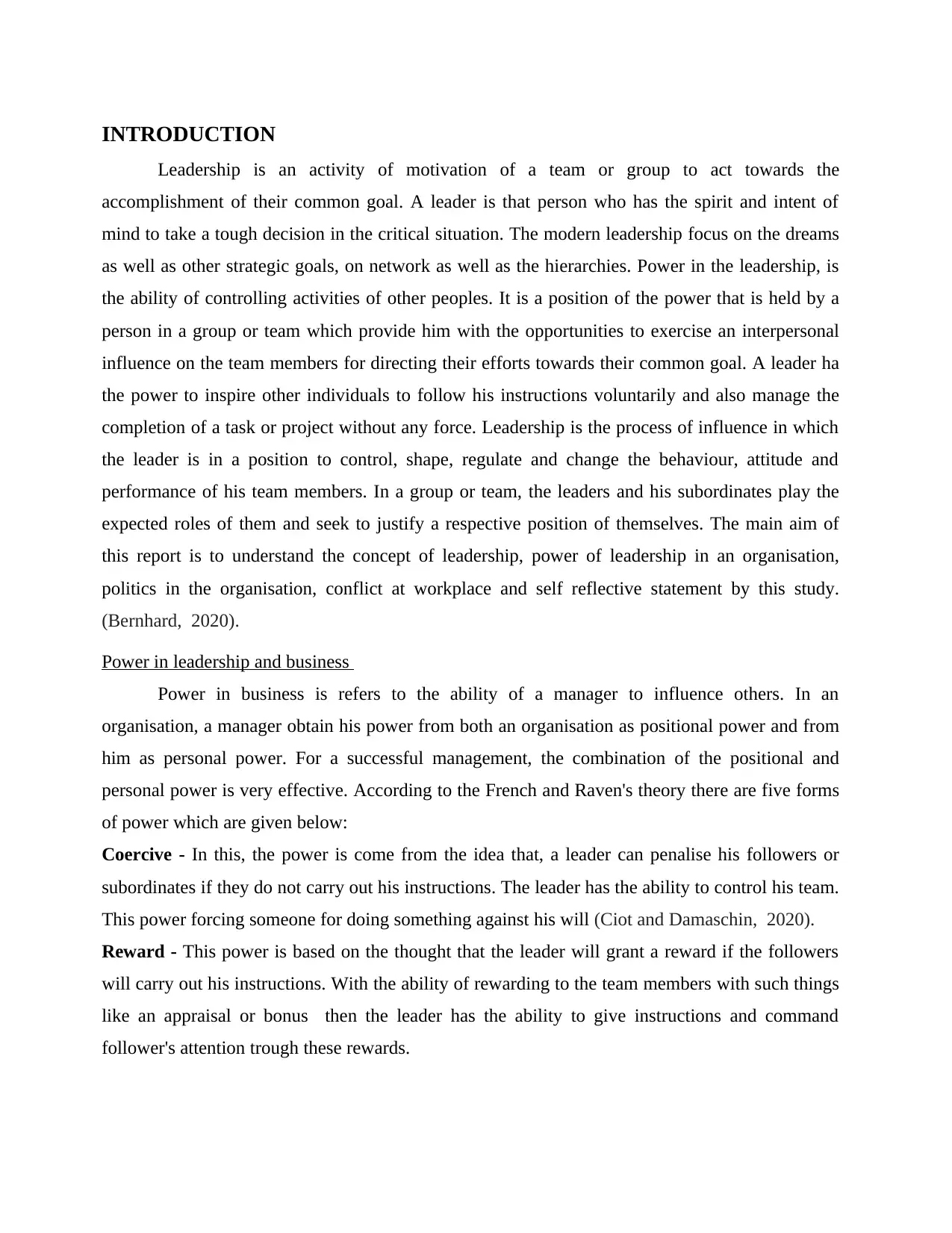
INTRODUCTION
Leadership is an activity of motivation of a team or group to act towards the
accomplishment of their common goal. A leader is that person who has the spirit and intent of
mind to take a tough decision in the critical situation. The modern leadership focus on the dreams
as well as other strategic goals, on network as well as the hierarchies. Power in the leadership, is
the ability of controlling activities of other peoples. It is a position of the power that is held by a
person in a group or team which provide him with the opportunities to exercise an interpersonal
influence on the team members for directing their efforts towards their common goal. A leader ha
the power to inspire other individuals to follow his instructions voluntarily and also manage the
completion of a task or project without any force. Leadership is the process of influence in which
the leader is in a position to control, shape, regulate and change the behaviour, attitude and
performance of his team members. In a group or team, the leaders and his subordinates play the
expected roles of them and seek to justify a respective position of themselves. The main aim of
this report is to understand the concept of leadership, power of leadership in an organisation,
politics in the organisation, conflict at workplace and self reflective statement by this study.
(Bernhard, 2020).
Power in leadership and business
Power in business is refers to the ability of a manager to influence others. In an
organisation, a manager obtain his power from both an organisation as positional power and from
him as personal power. For a successful management, the combination of the positional and
personal power is very effective. According to the French and Raven's theory there are five forms
of power which are given below:
Coercive - In this, the power is come from the idea that, a leader can penalise his followers or
subordinates if they do not carry out his instructions. The leader has the ability to control his team.
This power forcing someone for doing something against his will (Ciot and Damaschin, 2020).
Reward - This power is based on the thought that the leader will grant a reward if the followers
will carry out his instructions. With the ability of rewarding to the team members with such things
like an appraisal or bonus then the leader has the ability to give instructions and command
follower's attention trough these rewards.
Leadership is an activity of motivation of a team or group to act towards the
accomplishment of their common goal. A leader is that person who has the spirit and intent of
mind to take a tough decision in the critical situation. The modern leadership focus on the dreams
as well as other strategic goals, on network as well as the hierarchies. Power in the leadership, is
the ability of controlling activities of other peoples. It is a position of the power that is held by a
person in a group or team which provide him with the opportunities to exercise an interpersonal
influence on the team members for directing their efforts towards their common goal. A leader ha
the power to inspire other individuals to follow his instructions voluntarily and also manage the
completion of a task or project without any force. Leadership is the process of influence in which
the leader is in a position to control, shape, regulate and change the behaviour, attitude and
performance of his team members. In a group or team, the leaders and his subordinates play the
expected roles of them and seek to justify a respective position of themselves. The main aim of
this report is to understand the concept of leadership, power of leadership in an organisation,
politics in the organisation, conflict at workplace and self reflective statement by this study.
(Bernhard, 2020).
Power in leadership and business
Power in business is refers to the ability of a manager to influence others. In an
organisation, a manager obtain his power from both an organisation as positional power and from
him as personal power. For a successful management, the combination of the positional and
personal power is very effective. According to the French and Raven's theory there are five forms
of power which are given below:
Coercive - In this, the power is come from the idea that, a leader can penalise his followers or
subordinates if they do not carry out his instructions. The leader has the ability to control his team.
This power forcing someone for doing something against his will (Ciot and Damaschin, 2020).
Reward - This power is based on the thought that the leader will grant a reward if the followers
will carry out his instructions. With the ability of rewarding to the team members with such things
like an appraisal or bonus then the leader has the ability to give instructions and command
follower's attention trough these rewards.
⊘ This is a preview!⊘
Do you want full access?
Subscribe today to unlock all pages.

Trusted by 1+ million students worldwide
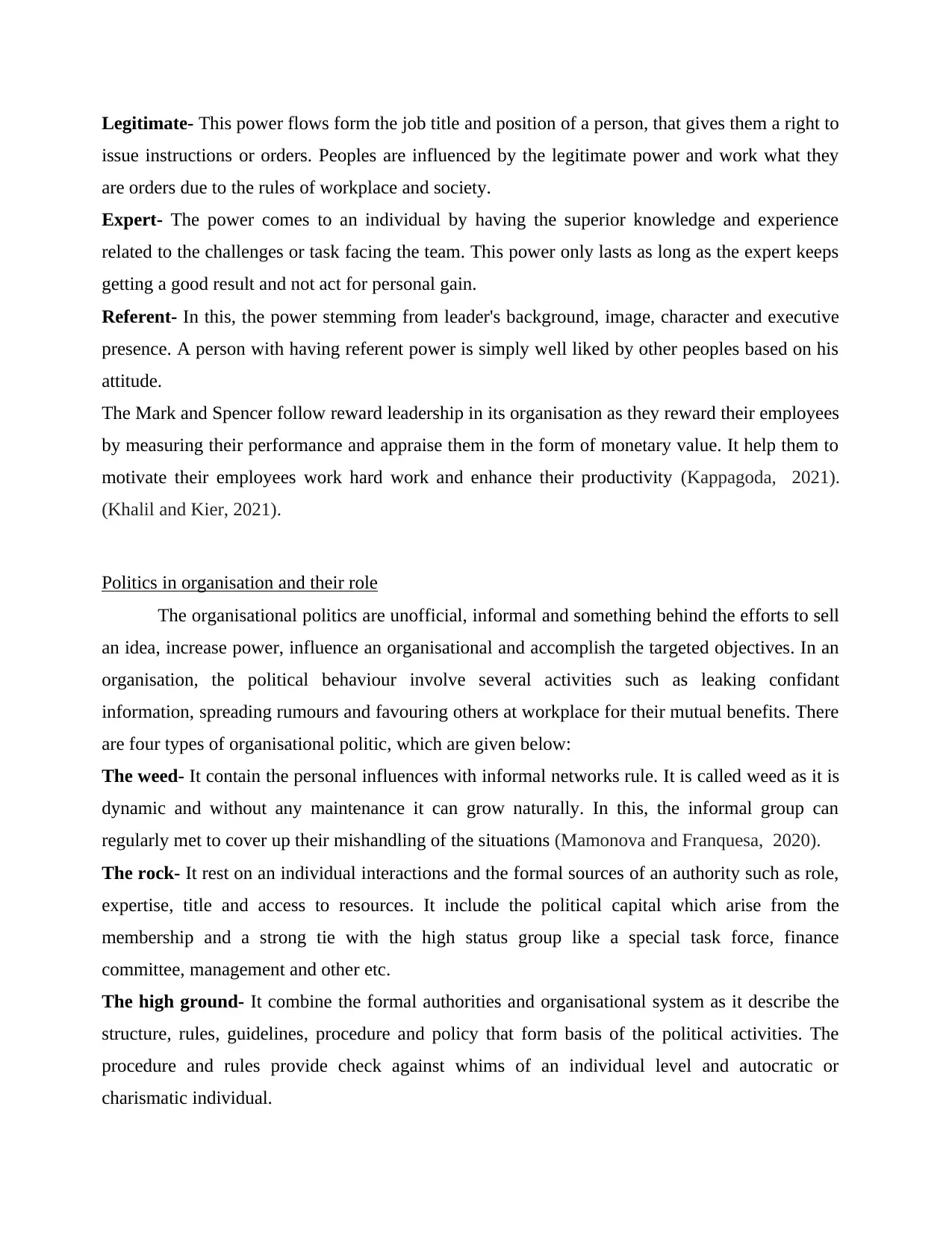
Legitimate- This power flows form the job title and position of a person, that gives them a right to
issue instructions or orders. Peoples are influenced by the legitimate power and work what they
are orders due to the rules of workplace and society.
Expert- The power comes to an individual by having the superior knowledge and experience
related to the challenges or task facing the team. This power only lasts as long as the expert keeps
getting a good result and not act for personal gain.
Referent- In this, the power stemming from leader's background, image, character and executive
presence. A person with having referent power is simply well liked by other peoples based on his
attitude.
The Mark and Spencer follow reward leadership in its organisation as they reward their employees
by measuring their performance and appraise them in the form of monetary value. It help them to
motivate their employees work hard work and enhance their productivity (Kappagoda, 2021).
(Khalil and Kier, 2021).
Politics in organisation and their role
The organisational politics are unofficial, informal and something behind the efforts to sell
an idea, increase power, influence an organisational and accomplish the targeted objectives. In an
organisation, the political behaviour involve several activities such as leaking confidant
information, spreading rumours and favouring others at workplace for their mutual benefits. There
are four types of organisational politic, which are given below:
The weed- It contain the personal influences with informal networks rule. It is called weed as it is
dynamic and without any maintenance it can grow naturally. In this, the informal group can
regularly met to cover up their mishandling of the situations (Mamonova and Franquesa, 2020).
The rock- It rest on an individual interactions and the formal sources of an authority such as role,
expertise, title and access to resources. It include the political capital which arise from the
membership and a strong tie with the high status group like a special task force, finance
committee, management and other etc.
The high ground- It combine the formal authorities and organisational system as it describe the
structure, rules, guidelines, procedure and policy that form basis of the political activities. The
procedure and rules provide check against whims of an individual level and autocratic or
charismatic individual.
issue instructions or orders. Peoples are influenced by the legitimate power and work what they
are orders due to the rules of workplace and society.
Expert- The power comes to an individual by having the superior knowledge and experience
related to the challenges or task facing the team. This power only lasts as long as the expert keeps
getting a good result and not act for personal gain.
Referent- In this, the power stemming from leader's background, image, character and executive
presence. A person with having referent power is simply well liked by other peoples based on his
attitude.
The Mark and Spencer follow reward leadership in its organisation as they reward their employees
by measuring their performance and appraise them in the form of monetary value. It help them to
motivate their employees work hard work and enhance their productivity (Kappagoda, 2021).
(Khalil and Kier, 2021).
Politics in organisation and their role
The organisational politics are unofficial, informal and something behind the efforts to sell
an idea, increase power, influence an organisational and accomplish the targeted objectives. In an
organisation, the political behaviour involve several activities such as leaking confidant
information, spreading rumours and favouring others at workplace for their mutual benefits. There
are four types of organisational politic, which are given below:
The weed- It contain the personal influences with informal networks rule. It is called weed as it is
dynamic and without any maintenance it can grow naturally. In this, the informal group can
regularly met to cover up their mishandling of the situations (Mamonova and Franquesa, 2020).
The rock- It rest on an individual interactions and the formal sources of an authority such as role,
expertise, title and access to resources. It include the political capital which arise from the
membership and a strong tie with the high status group like a special task force, finance
committee, management and other etc.
The high ground- It combine the formal authorities and organisational system as it describe the
structure, rules, guidelines, procedure and policy that form basis of the political activities. The
procedure and rules provide check against whims of an individual level and autocratic or
charismatic individual.
Paraphrase This Document
Need a fresh take? Get an instant paraphrase of this document with our AI Paraphraser
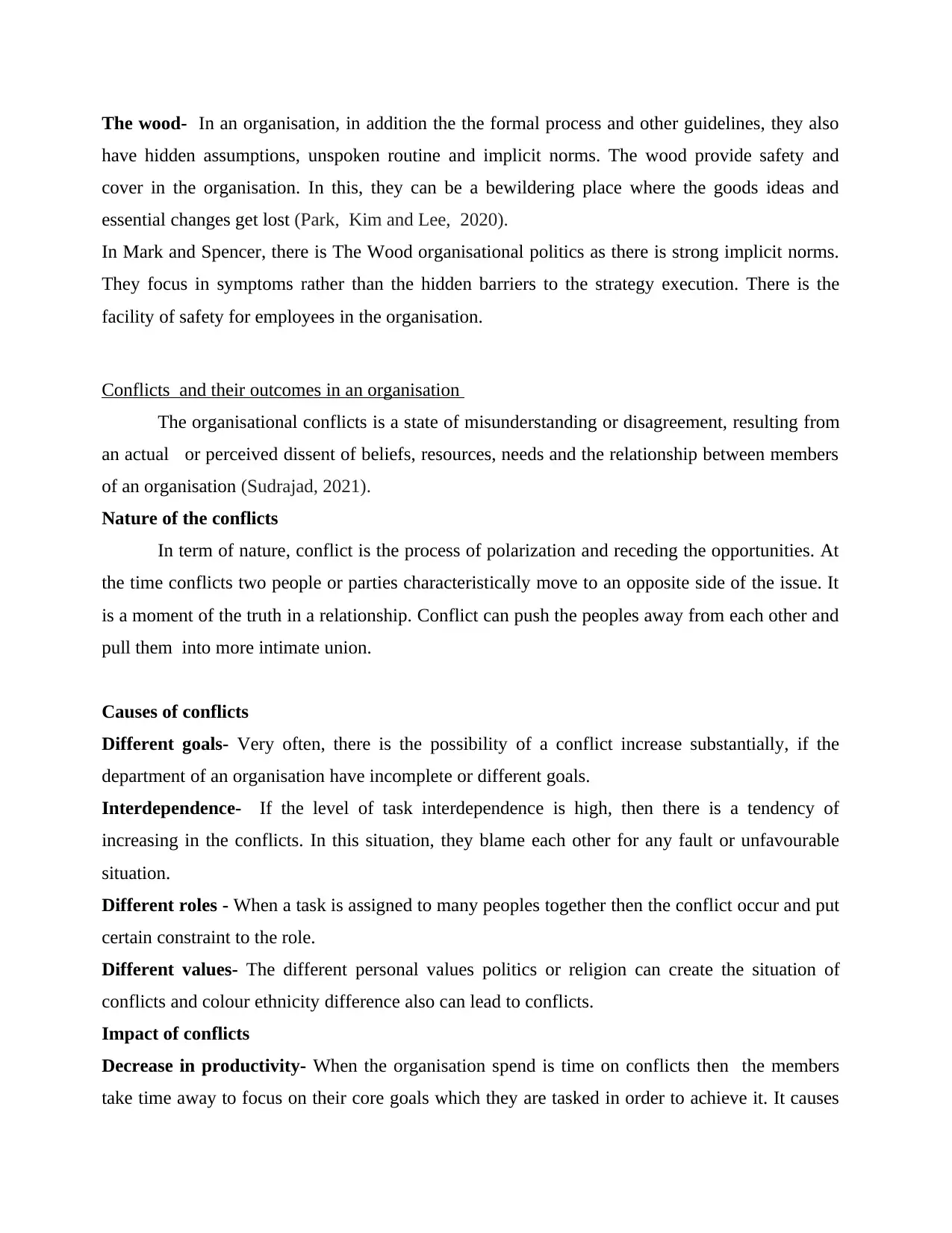
The wood- In an organisation, in addition the the formal process and other guidelines, they also
have hidden assumptions, unspoken routine and implicit norms. The wood provide safety and
cover in the organisation. In this, they can be a bewildering place where the goods ideas and
essential changes get lost (Park, Kim and Lee, 2020).
In Mark and Spencer, there is The Wood organisational politics as there is strong implicit norms.
They focus in symptoms rather than the hidden barriers to the strategy execution. There is the
facility of safety for employees in the organisation.
Conflicts and their outcomes in an organisation
The organisational conflicts is a state of misunderstanding or disagreement, resulting from
an actual or perceived dissent of beliefs, resources, needs and the relationship between members
of an organisation (Sudrajad, 2021).
Nature of the conflicts
In term of nature, conflict is the process of polarization and receding the opportunities. At
the time conflicts two people or parties characteristically move to an opposite side of the issue. It
is a moment of the truth in a relationship. Conflict can push the peoples away from each other and
pull them into more intimate union.
Causes of conflicts
Different goals- Very often, there is the possibility of a conflict increase substantially, if the
department of an organisation have incomplete or different goals.
Interdependence- If the level of task interdependence is high, then there is a tendency of
increasing in the conflicts. In this situation, they blame each other for any fault or unfavourable
situation.
Different roles - When a task is assigned to many peoples together then the conflict occur and put
certain constraint to the role.
Different values- The different personal values politics or religion can create the situation of
conflicts and colour ethnicity difference also can lead to conflicts.
Impact of conflicts
Decrease in productivity- When the organisation spend is time on conflicts then the members
take time away to focus on their core goals which they are tasked in order to achieve it. It causes
have hidden assumptions, unspoken routine and implicit norms. The wood provide safety and
cover in the organisation. In this, they can be a bewildering place where the goods ideas and
essential changes get lost (Park, Kim and Lee, 2020).
In Mark and Spencer, there is The Wood organisational politics as there is strong implicit norms.
They focus in symptoms rather than the hidden barriers to the strategy execution. There is the
facility of safety for employees in the organisation.
Conflicts and their outcomes in an organisation
The organisational conflicts is a state of misunderstanding or disagreement, resulting from
an actual or perceived dissent of beliefs, resources, needs and the relationship between members
of an organisation (Sudrajad, 2021).
Nature of the conflicts
In term of nature, conflict is the process of polarization and receding the opportunities. At
the time conflicts two people or parties characteristically move to an opposite side of the issue. It
is a moment of the truth in a relationship. Conflict can push the peoples away from each other and
pull them into more intimate union.
Causes of conflicts
Different goals- Very often, there is the possibility of a conflict increase substantially, if the
department of an organisation have incomplete or different goals.
Interdependence- If the level of task interdependence is high, then there is a tendency of
increasing in the conflicts. In this situation, they blame each other for any fault or unfavourable
situation.
Different roles - When a task is assigned to many peoples together then the conflict occur and put
certain constraint to the role.
Different values- The different personal values politics or religion can create the situation of
conflicts and colour ethnicity difference also can lead to conflicts.
Impact of conflicts
Decrease in productivity- When the organisation spend is time on conflicts then the members
take time away to focus on their core goals which they are tasked in order to achieve it. It causes
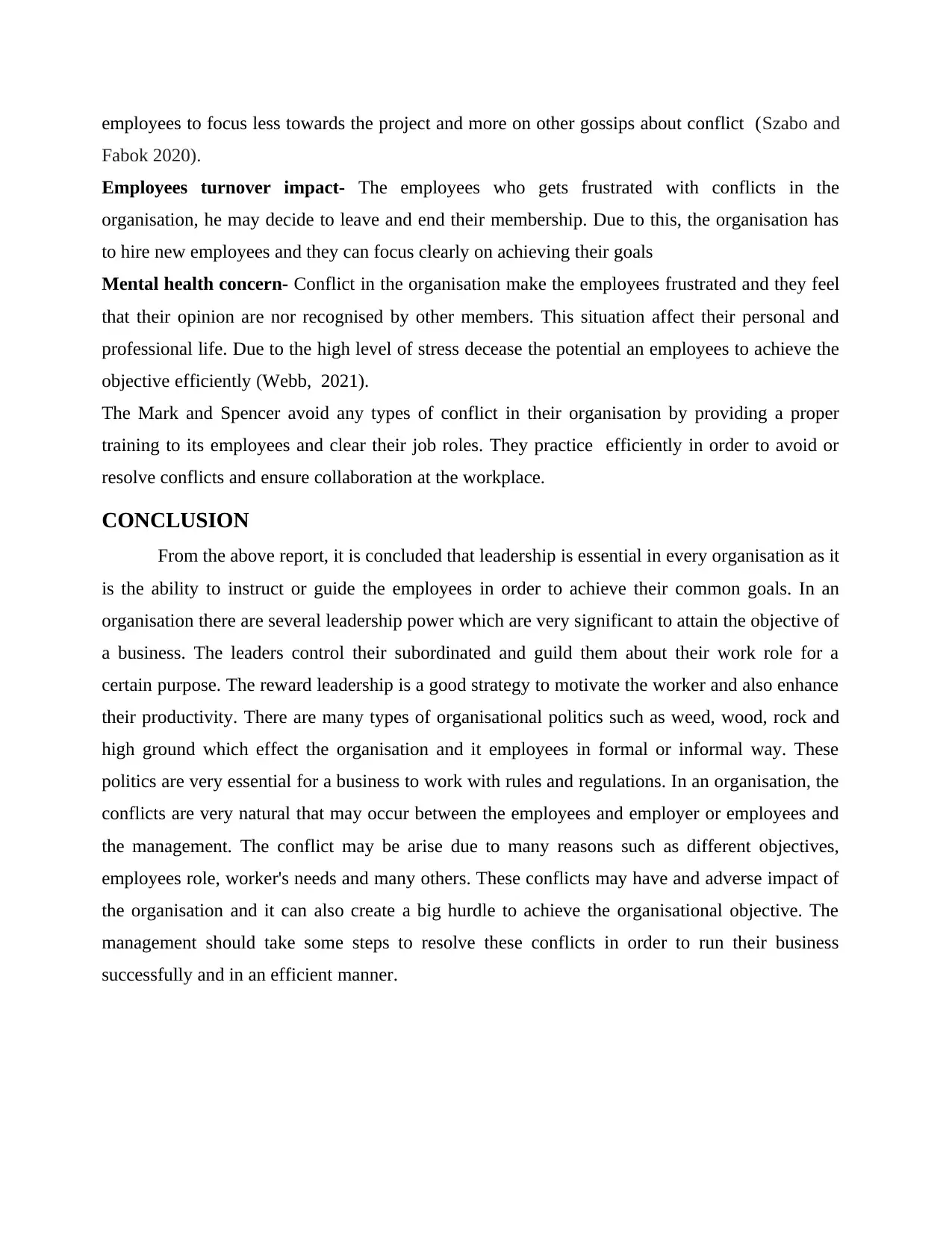
employees to focus less towards the project and more on other gossips about conflict (Szabo and
Fabok 2020).
Employees turnover impact- The employees who gets frustrated with conflicts in the
organisation, he may decide to leave and end their membership. Due to this, the organisation has
to hire new employees and they can focus clearly on achieving their goals
Mental health concern- Conflict in the organisation make the employees frustrated and they feel
that their opinion are nor recognised by other members. This situation affect their personal and
professional life. Due to the high level of stress decease the potential an employees to achieve the
objective efficiently (Webb, 2021).
The Mark and Spencer avoid any types of conflict in their organisation by providing a proper
training to its employees and clear their job roles. They practice efficiently in order to avoid or
resolve conflicts and ensure collaboration at the workplace.
CONCLUSION
From the above report, it is concluded that leadership is essential in every organisation as it
is the ability to instruct or guide the employees in order to achieve their common goals. In an
organisation there are several leadership power which are very significant to attain the objective of
a business. The leaders control their subordinated and guild them about their work role for a
certain purpose. The reward leadership is a good strategy to motivate the worker and also enhance
their productivity. There are many types of organisational politics such as weed, wood, rock and
high ground which effect the organisation and it employees in formal or informal way. These
politics are very essential for a business to work with rules and regulations. In an organisation, the
conflicts are very natural that may occur between the employees and employer or employees and
the management. The conflict may be arise due to many reasons such as different objectives,
employees role, worker's needs and many others. These conflicts may have and adverse impact of
the organisation and it can also create a big hurdle to achieve the organisational objective. The
management should take some steps to resolve these conflicts in order to run their business
successfully and in an efficient manner.
Fabok 2020).
Employees turnover impact- The employees who gets frustrated with conflicts in the
organisation, he may decide to leave and end their membership. Due to this, the organisation has
to hire new employees and they can focus clearly on achieving their goals
Mental health concern- Conflict in the organisation make the employees frustrated and they feel
that their opinion are nor recognised by other members. This situation affect their personal and
professional life. Due to the high level of stress decease the potential an employees to achieve the
objective efficiently (Webb, 2021).
The Mark and Spencer avoid any types of conflict in their organisation by providing a proper
training to its employees and clear their job roles. They practice efficiently in order to avoid or
resolve conflicts and ensure collaboration at the workplace.
CONCLUSION
From the above report, it is concluded that leadership is essential in every organisation as it
is the ability to instruct or guide the employees in order to achieve their common goals. In an
organisation there are several leadership power which are very significant to attain the objective of
a business. The leaders control their subordinated and guild them about their work role for a
certain purpose. The reward leadership is a good strategy to motivate the worker and also enhance
their productivity. There are many types of organisational politics such as weed, wood, rock and
high ground which effect the organisation and it employees in formal or informal way. These
politics are very essential for a business to work with rules and regulations. In an organisation, the
conflicts are very natural that may occur between the employees and employer or employees and
the management. The conflict may be arise due to many reasons such as different objectives,
employees role, worker's needs and many others. These conflicts may have and adverse impact of
the organisation and it can also create a big hurdle to achieve the organisational objective. The
management should take some steps to resolve these conflicts in order to run their business
successfully and in an efficient manner.
⊘ This is a preview!⊘
Do you want full access?
Subscribe today to unlock all pages.

Trusted by 1+ million students worldwide
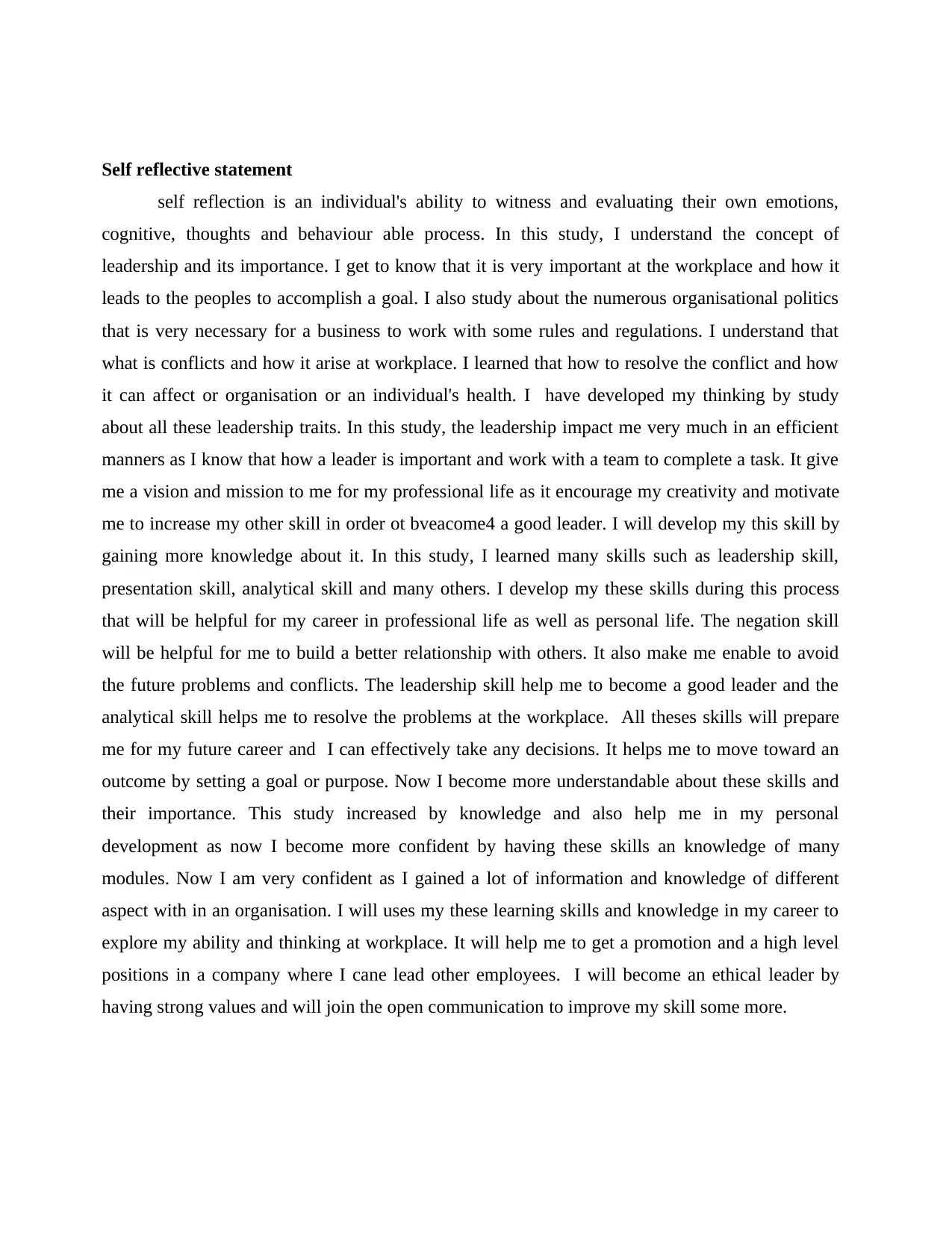
Self reflective statement
self reflection is an individual's ability to witness and evaluating their own emotions,
cognitive, thoughts and behaviour able process. In this study, I understand the concept of
leadership and its importance. I get to know that it is very important at the workplace and how it
leads to the peoples to accomplish a goal. I also study about the numerous organisational politics
that is very necessary for a business to work with some rules and regulations. I understand that
what is conflicts and how it arise at workplace. I learned that how to resolve the conflict and how
it can affect or organisation or an individual's health. I have developed my thinking by study
about all these leadership traits. In this study, the leadership impact me very much in an efficient
manners as I know that how a leader is important and work with a team to complete a task. It give
me a vision and mission to me for my professional life as it encourage my creativity and motivate
me to increase my other skill in order ot bveacome4 a good leader. I will develop my this skill by
gaining more knowledge about it. In this study, I learned many skills such as leadership skill,
presentation skill, analytical skill and many others. I develop my these skills during this process
that will be helpful for my career in professional life as well as personal life. The negation skill
will be helpful for me to build a better relationship with others. It also make me enable to avoid
the future problems and conflicts. The leadership skill help me to become a good leader and the
analytical skill helps me to resolve the problems at the workplace. All theses skills will prepare
me for my future career and I can effectively take any decisions. It helps me to move toward an
outcome by setting a goal or purpose. Now I become more understandable about these skills and
their importance. This study increased by knowledge and also help me in my personal
development as now I become more confident by having these skills an knowledge of many
modules. Now I am very confident as I gained a lot of information and knowledge of different
aspect with in an organisation. I will uses my these learning skills and knowledge in my career to
explore my ability and thinking at workplace. It will help me to get a promotion and a high level
positions in a company where I cane lead other employees. I will become an ethical leader by
having strong values and will join the open communication to improve my skill some more.
self reflection is an individual's ability to witness and evaluating their own emotions,
cognitive, thoughts and behaviour able process. In this study, I understand the concept of
leadership and its importance. I get to know that it is very important at the workplace and how it
leads to the peoples to accomplish a goal. I also study about the numerous organisational politics
that is very necessary for a business to work with some rules and regulations. I understand that
what is conflicts and how it arise at workplace. I learned that how to resolve the conflict and how
it can affect or organisation or an individual's health. I have developed my thinking by study
about all these leadership traits. In this study, the leadership impact me very much in an efficient
manners as I know that how a leader is important and work with a team to complete a task. It give
me a vision and mission to me for my professional life as it encourage my creativity and motivate
me to increase my other skill in order ot bveacome4 a good leader. I will develop my this skill by
gaining more knowledge about it. In this study, I learned many skills such as leadership skill,
presentation skill, analytical skill and many others. I develop my these skills during this process
that will be helpful for my career in professional life as well as personal life. The negation skill
will be helpful for me to build a better relationship with others. It also make me enable to avoid
the future problems and conflicts. The leadership skill help me to become a good leader and the
analytical skill helps me to resolve the problems at the workplace. All theses skills will prepare
me for my future career and I can effectively take any decisions. It helps me to move toward an
outcome by setting a goal or purpose. Now I become more understandable about these skills and
their importance. This study increased by knowledge and also help me in my personal
development as now I become more confident by having these skills an knowledge of many
modules. Now I am very confident as I gained a lot of information and knowledge of different
aspect with in an organisation. I will uses my these learning skills and knowledge in my career to
explore my ability and thinking at workplace. It will help me to get a promotion and a high level
positions in a company where I cane lead other employees. I will become an ethical leader by
having strong values and will join the open communication to improve my skill some more.
Paraphrase This Document
Need a fresh take? Get an instant paraphrase of this document with our AI Paraphraser
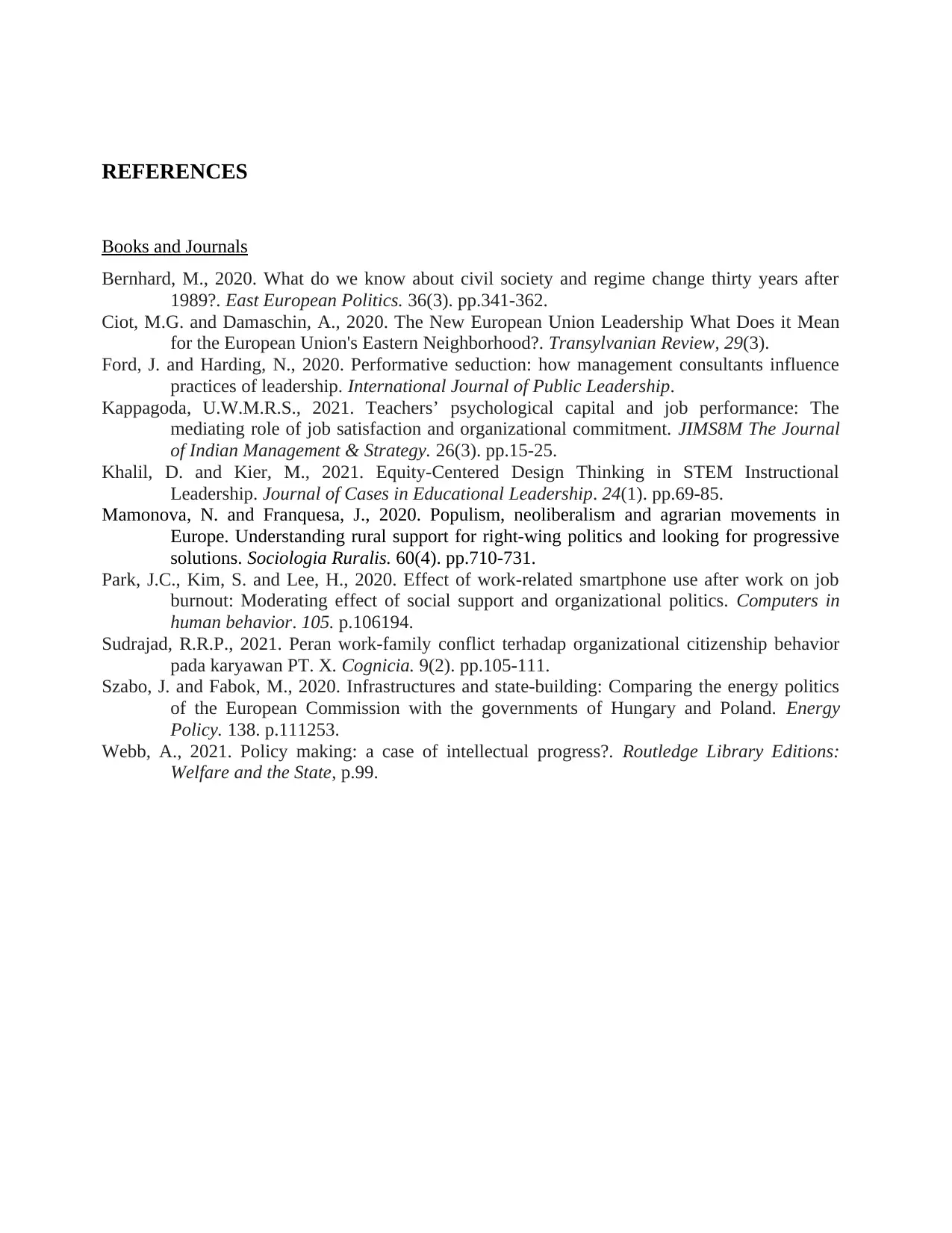
REFERENCES
Books and Journals
Bernhard, M., 2020. What do we know about civil society and regime change thirty years after
1989?. East European Politics. 36(3). pp.341-362.
Ciot, M.G. and Damaschin, A., 2020. The New European Union Leadership What Does it Mean
for the European Union's Eastern Neighborhood?. Transylvanian Review, 29(3).
Ford, J. and Harding, N., 2020. Performative seduction: how management consultants influence
practices of leadership. International Journal of Public Leadership.
Kappagoda, U.W.M.R.S., 2021. Teachers’ psychological capital and job performance: The
mediating role of job satisfaction and organizational commitment. JIMS8M The Journal
of Indian Management & Strategy. 26(3). pp.15-25.
Khalil, D. and Kier, M., 2021. Equity-Centered Design Thinking in STEM Instructional
Leadership. Journal of Cases in Educational Leadership. 24(1). pp.69-85.
Mamonova, N. and Franquesa, J., 2020. Populism, neoliberalism and agrarian movements in
Europe. Understanding rural support for right‐wing politics and looking for progressive
solutions. Sociologia Ruralis. 60(4). pp.710-731.
Park, J.C., Kim, S. and Lee, H., 2020. Effect of work-related smartphone use after work on job
burnout: Moderating effect of social support and organizational politics. Computers in
human behavior. 105. p.106194.
Sudrajad, R.R.P., 2021. Peran work-family conflict terhadap organizational citizenship behavior
pada karyawan PT. X. Cognicia. 9(2). pp.105-111.
Szabo, J. and Fabok, M., 2020. Infrastructures and state-building: Comparing the energy politics
of the European Commission with the governments of Hungary and Poland. Energy
Policy. 138. p.111253.
Webb, A., 2021. Policy making: a case of intellectual progress?. Routledge Library Editions:
Welfare and the State, p.99.
Books and Journals
Bernhard, M., 2020. What do we know about civil society and regime change thirty years after
1989?. East European Politics. 36(3). pp.341-362.
Ciot, M.G. and Damaschin, A., 2020. The New European Union Leadership What Does it Mean
for the European Union's Eastern Neighborhood?. Transylvanian Review, 29(3).
Ford, J. and Harding, N., 2020. Performative seduction: how management consultants influence
practices of leadership. International Journal of Public Leadership.
Kappagoda, U.W.M.R.S., 2021. Teachers’ psychological capital and job performance: The
mediating role of job satisfaction and organizational commitment. JIMS8M The Journal
of Indian Management & Strategy. 26(3). pp.15-25.
Khalil, D. and Kier, M., 2021. Equity-Centered Design Thinking in STEM Instructional
Leadership. Journal of Cases in Educational Leadership. 24(1). pp.69-85.
Mamonova, N. and Franquesa, J., 2020. Populism, neoliberalism and agrarian movements in
Europe. Understanding rural support for right‐wing politics and looking for progressive
solutions. Sociologia Ruralis. 60(4). pp.710-731.
Park, J.C., Kim, S. and Lee, H., 2020. Effect of work-related smartphone use after work on job
burnout: Moderating effect of social support and organizational politics. Computers in
human behavior. 105. p.106194.
Sudrajad, R.R.P., 2021. Peran work-family conflict terhadap organizational citizenship behavior
pada karyawan PT. X. Cognicia. 9(2). pp.105-111.
Szabo, J. and Fabok, M., 2020. Infrastructures and state-building: Comparing the energy politics
of the European Commission with the governments of Hungary and Poland. Energy
Policy. 138. p.111253.
Webb, A., 2021. Policy making: a case of intellectual progress?. Routledge Library Editions:
Welfare and the State, p.99.
1 out of 8
Related Documents
Your All-in-One AI-Powered Toolkit for Academic Success.
+13062052269
info@desklib.com
Available 24*7 on WhatsApp / Email
![[object Object]](/_next/static/media/star-bottom.7253800d.svg)
Unlock your academic potential
Copyright © 2020–2025 A2Z Services. All Rights Reserved. Developed and managed by ZUCOL.





